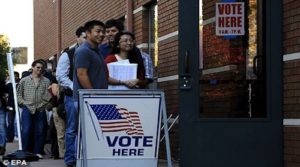
Asian American voters at a polling place, NEW AMERICA MEDIA
WASHINGTON, DC –The number of identified registered Asian Americans more than doubled from 3.2 to 7.2 million after the most extensive ethnicity modeling was provided by the AAPI Victory Fund in partnership with VEDA Data Solutions.
“Our biggest national databases are missing crucial details and do not provide a clear picture of voters,” said Shekar Narasimhan, chairman and founder of the AAPI Victory Fund.
“When voter files list ‘unknown,’ it becomes challenging to engage with voters on issues that will resonate with them. This data will allow us to meet our goal of increased engagement with the growing Asian American community,” he added.
“Micro-targeting at this level changes the outcome of elections. The system can more effectively target, research and communicate with over 7.2 million Asian American voters, including 1.4 million potential new voters,” explained Narasimha.
Through data modeling, more than 7.2 million Chinese, Japanese, Filipino, Korean, South Asian and Vietnamese Americans were identified nationally, including over 1.4 million potential new voters. Prior to this model, organizations had ethnicity information on fewer than 3.2 million of the 18.5 million Asian Americans in the United States.
“Increased naturalization rates and increased civic engagement have resulted in an unprecedented growth of new Asian American voters,” said Varun Nikore, AAPI Victory Fund vice chair of strategy & operations. “Our goal is to ensure that all eligible Asian American voters are registered and exercise their right to vote in this critical election.”
The Asian American electorate is the fastest growing demographic group. The primary tool used by unions, progressive groups and even the national parties to target and engage voters — the national databases known as “voter files” — fail to capture a critical data point for our community — ethnicity. At the state level, AAPI Victory Fund was able to model ethnicity for:
- Over 250,000 in Virginia
- Almost 200,000 in Georgia
- Over 160,000 in Ohio
- Nearly 100,000 in North Carolina
- Over 70,000 in Nevada
“VEDA’s machine learning-backed models use thousands of inputs, including individual-level, household-level, neighborhood-level and regional-level data on demographics, consumer behavior, political interests and U.S. Census data, enabling us to understand the subtle differences between cultures and help the AAPI Victory Fund reach out to members of their community,” said Meghan Gaffney Buck, founder and CEO of VEDA Data Solutions.
“Our patent-pending technologies help organizations like the AAPI Victory Fund to find fast and accurate ways to better connect with individuals and to use data to gain better insights about their constituencies or their customers,” she added.